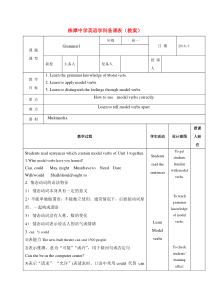 DOC
DOC
【文档说明】江西省万载县株潭中学人教版高中英语必修三教案:Unit1FestivalsaroundtheworldGrammar1.docx,共(2)页,15.383 KB,由小赞的店铺上传
转载请保留链接:https://www.doc5u.com/view-b05515799838d1c807c63fd5045530bc.html
以下为本文档部分文字说明:
株潭中学英语学科备课表(教案)课题课型Grammar1年级高一日期2018.3新授主备人复备人授课人教学目标1.LearnthegrammarknowledgeofModalverbs.2.Learntoapplymodelverbs.3.Learntodistinguishthefeel
ingsthroughmodelverbs重点Howtousemodalverbscorrectly.难点Learntotellmodelverbsapart.器材Multimedia教学过程学生活动设计意图授课人标注Studentsreadsentenceswhic
hcontainmodelverbsofUnit1together.1.Whatmodalverbshaveyoulearned?Can,couldMay,mightMust/havetoNeedDareWill/wouldShall/should/oughtto2.
情态动词的语法特征1)情态动词本身具有一定的意义2)不能单独做谓语,不能独立使用。通常情况下,后面接动词原形,一起构成谓语3)情态动词没有人称,数的变化4)情态动词表示说话人的语气或情绪3.can与could1)表能力Thenew-builttheatrecanse
at1500people.2)表示推测,意为“可能”“或许”,用于疑问句或否定句Canshebeinthecomputercenter?3)表示“请求”“允许”(表请求时,口语中常用could代替canStud
entsreadthesentencesLearnModelverbsTogetstudentsfamiliarwithmodelverbs.Toteachgrammarknowledgeofmodelverbs.Tocheckstudents’l
earningeffect使语气更委婉,回答时用can)Can/CouldIuseyourdictionary?4)表示“许可”,可与may换用。Youcangohomenow.5)can用于疑问句或否定句中时,表惊异、不相信等,意思是“可能、能够”。Howcanyo
usaythatyoureallyunderstandthewholestoryifyouhavecoveredonlypartofthearticle?6)can’t/couldn’t+have+done表示对过去情况的否定推测Susancan’th
avewrittenareportlikethis.7)could+have+done表示对过去能做而未做的事情感到惋惜,遗憾;常译为本可以TofinishtheclassexercisesDoexercises
inworkbook.FinishtheexerciseToconsolidatewhatstudentshavelearntinthisclass.板书设计Modelverbscan/could教学反思